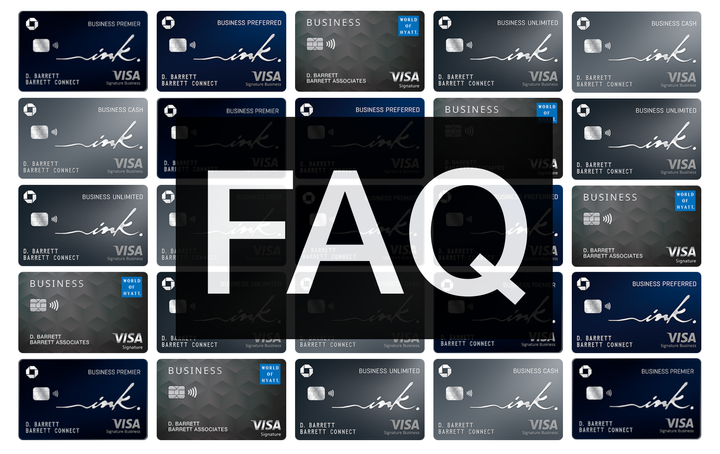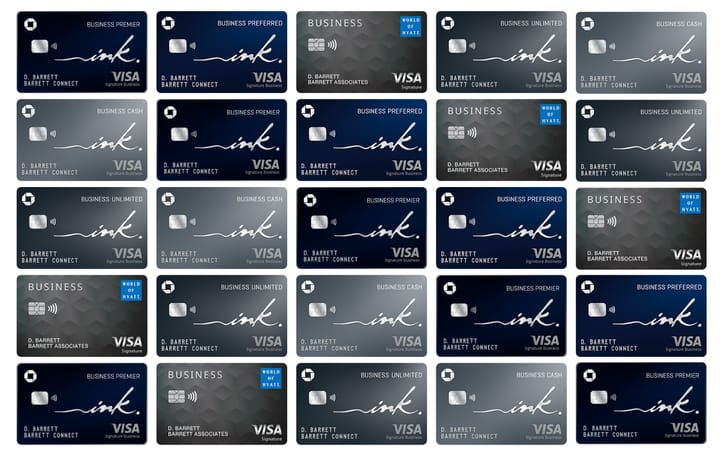Navigating Chase Ink Business Recon Questions: A Comprehensive Guide
Unlock the secrets to Chase Ink business reconsideration. From mastering common recon questions to tackling objections, learn everything you need for a successful call.

Introduction to Chase Ink Reconsideration: What You Need to Know
If you're reading this, chances are you're gearing up to dial the Chase recon department, and let's be honest, it feels a bit like prepping for a big job interview. Worry not. In this post, we’ll dive into how to prepare for your call, what sort of questions to expect, and how to navigate common objections thrown by the recon analyst.

Why should you trust this guide? Over the past 5 years, I've secured over ten Ink card approvals (click here for a comprehensive guide to getting approved for multiple Chase Ink cards), and have navigated countless recon calls. Each call taught me something new. Now, I'm passing on t treasure trove of insider knowledge to you. By the end of this post, you'll not only be ready to tackle that recon call, but you'll do so with the confidence of a Chase Ink veteran. Dive in!
Preparing for Your Chase Ink Business Reconsideration Call

Before you even think about picking up the phone, there's homework to be done. First, you need to have a clear reason for applying for the card. For instance, when I applied for my Ink Preferred after having the Ink Cash, my reasoning was crystal clear. I wanted the Ink Preferred for its no foreign transaction fees, perfectly matching my business's frequent international spending. Your motive for another card should be equally solid, directly linked to the card’s value proposition, for example, 5% cashback categories that align with your expenses.
Second, you need to know your business inside out, especially the financials. We will go through all the possible recon questions in detail in the next section.
Here are a couple of tips to be effective on your call:
- Politeness Pays Off: Remember, the rep is your gateway, not your gatekeeper. A friendly tone and a thank you can go a long way. Address them by their first name, make them feel appreciated and respected, and watch how the conversation changes.
- Be Direct and Honest: They're not just asking questions; they're trying to plug your answers into their credit guidance system. Don't beat around the bush. If your business revenue varies, give them a clear estimate. Even if you aren’t sure of your exact annual business revenues, something like, "I expect it to average about $6,000 to $8,000 per year" helps them process your reconsideration application.
Understanding The Chase Business Reconsideration Process
The Chase reconsideration process is straightforward. But it is helpful to learn the rules of a game before you play. A quick walkthrough:
- Making the Call: It all begins with dialing the Chase reconsideration line at 1-888-609-7805. This is your entry point into the process.
- Identity Verification: Once connected, you'll pass through a verification checkpoint. Chase might send a text to your mobile for quick verification, or you might answer a series of questions to confirm your identity.
- Recon Questions: Next up, the representative dives into the reconsideration questions. This is where your preparation pays off, as they'll inquire about various aspects of your business and financial health. In the section below, you’ll find a list of all the possible recon questions.
- On Hold for Processing: After the Q&A round, you'll be put on hold while the rep processes your application. These few minutes might feel like an eternity, but they're just putting the information you provided through their credit guidance system.
- Approval or Rejection: More often than not, you'll get an instant decision – approval or rejection. Occasionally, they’ll inform you that you’d be notified in writing in 7–10 days.
Here is a flowchart that gained popularity on Reddit, visually breaking down these steps. This flowchart has become a go-to reference for many, simplifying the recon path into an easy-to-follow diagram.

Questions to Expect During Your Chase Ink Reconsideration Call
First, we'll tackle the typical questions you might face, then we'll dive into how our hypothetical friend, Tom Tucker, navigated his call, giving you a real-world scenario to help paint the picture.
Part 1: Common Questions in Chase Ink Business Card Reconsideration
Here are some questions you might get hit with:
- What is your business and what do you sell? They're looking to gauge the legitimacy and scope of your operations.
- How old is your business, and how long have you been in the trade? This helps them assess stability and experience.
- Number of employees? Whether it's just you or a team, they're checking the size and scale of your business.
- Why does your business need this credit card? Here's your chance to align the card's perks with your business needs.
- What is your annual revenue, expenses, and profits? Be ready with hard numbers for the past couple of years and projections for the future.
- Are you currently operating at a profit or loss? They're looking to understand the financial health of your business.
- How do you acquire your customers? This sheds light on the sustainability and growth potential of your business.
Part 2: Case Study — Tom's Story

Let’s go through a hypothetical case: meet Tom Tucker. By day, he's a software engineer; by night, a savvy consultant, raking in about $7K last year with a projection of $10K this year. He's eyeing the Ink Preferred for its travel perks, fitting his onebagging nomadic business style. Let's see how Tom's call went down:
What is your business and what do you sell?
Tom's Response: "I run a software consulting business, offering expertise at $400-500 an hour. I've been in the software engineering trade for over a decade, and I consult on complex projects."
How old is your business, and how long have you been in the trade?
Tom's Response: "The consulting gig has been my side hustle for 2 years, but I've been engineering software for over 10 years."
Number of employees?
Tom's Response: "It's just me. I handle everything from client acquisition to delivery."
Why does your business need this credit card?
Tom's Response: "I travel frequently for client meetings, and the Ink Preferred's travel perks and no international transaction fees are a perfect fit for my business."
What is your annual revenue, expenses, and profits?
Tom's Response: "Last year, I made around $7K, but I'm projecting $10K this year thanks to an expanding client base. My profit margins hover around 70%, with most expenses going towards travel and software."
Are you currently operating at a profit or loss?
Tom's Response: "I've been profitable from the start, maintaining a lean operation with high margins of around 70-80%.”
How do you acquire your customers?
Tom's Response: "Mostly through word of mouth. My work speaks for itself, and satisfied clients often refer others my way."
Tom's example shows that whether you're a one-person show or running a bigger operation, understanding and articulating the specifics of your business can make all the difference on that call. Remember, the more confidently and clearly you can present your case, the better your chances of success.
Mastering Objection Handling For Chase Ink Business Recons
Navigating reconsideration calls means being ready to tackle some common objections. Here's how you can smoothly address them, illustrated with real-life scenarios and tips.

Too Many Recent Inquiries on Your Chase Application
- The Objection: Chase is jittery about you applying for too many loans or cards in a short period. For example, you might have applied for more than 2 cards in the past 30 days, exceeding their 2/30 rule.
- The Approach: Explain the context behind each inquiry. Maybe you were comparing rates for a home loan. Assure them these were calculated, non-desperate one-time moves.
Addressing Concerns of Excessive Credit in Your Chase Ink Application
- The Objection: Chase might think your plate is already too full of credit.
- The Approach: Offer to reallocate credit from an existing card. This shows you're not after more credit, just more suitable terms. This is the most common objection I face, and also one of the easiest to overcome.
Resolving Business Address Discrepancies in Chase Ink Applications
- The Objection: The address you provided doesn't align with other records.
- The Approach: Verify the correct address with Chase. Be it your home or office, update them with the right one to clear up any confusion. This is the easiest objection to resolve.
Handling High Balance Objections in Your Chase Ink Card Application
- The Objection: High balances elsewhere (with Chase, or elsewhere) can signal to Chase that you're overextending.
- The Approach: If high balances are temporary (say, due to a wedding or vacation), or if it is from an introductory 0% APR offer, clarify this. It's about showing these aren't your usual spending habits. If they don’t budge, pay off these balances, and call again. Your credit application remains valid for up to 30 days, which allows you ample time for the paid-off balances to reflect in your latest credit report.
Overcoming Insufficient Credit History in Chase Business Card Applications
- The Objection: Especially for newer businesses, a short credit history can be a stumbling block.
- The Approach: Highlight your reliable financial behavior — no late payments, a healthy savings account, etc. Sometimes, a good personal banking relationship with Chase can increase your approval odds.
What to Do When Information Verification Fails in Your Chase Application
- The Objection: There's a hiccup in verifying the details you've provided.
- The Approach: This is one of the most common and easiest objection to resolve. Ask specifically what couldn't be verified. Provide additional documents or correct any inaccuracies on the spot if possible. Here is a list of the most frequently requested business documents from Chase.
Navigating the Chase 5/24 Rule During Business Card Reconsideration
- The Objection: You've hit the ceiling with more than 5 card applications in 24 months.
- The Approach: First, ensure the count is accurate and doesn't include authorized users. If you're indeed over the limit, understanding the rule's details can help plan your next move. Occasionally, there might be wiggle room, but it's very rare. This is why I always recommend knowing your 5/24 status before applying for a Chase card.
Declined Due to a Bad Relationship with Chase
- The Objection: Past issues with Chase might lead to a decline, such as a shutdown or delinquent payments.
- The Approach: This one's tough. If it's due to a previous shutdown, it's often final.
Each objection is the start of a conversation, not a dead end. Your strategy should be to understand Chase's concerns genuinely and address them with clear, honest, and specific responses. Remember, every objection is an opportunity to reinforce your case and demonstrate why your business deserves that credit card.
Conclusion: Wrapping Up Your Chase Ink Business Card Reconsideration Journey

Just like we discussed at the start, gearing up for that Chase reconsideration call can feel daunting, almost like a major job interview. But with the insights and strategies we've covered, you're now equipped to handle it like a pro. From understanding the step-by-step process and prepping for common questions to navigating through typical objections, you're ready to make your case confidently. The key is clarity, preparation, and a bit of tact.
I'd love to hear about your experiences or any questions you might have. Did you face a curveball question or objection during your call? Or maybe you have a tip that worked wonders for you? Drop a comment below and share your story. Your insights not only help me tailor better content for you, but also create a community of shared knowledge we can all benefit from.



Comments ()